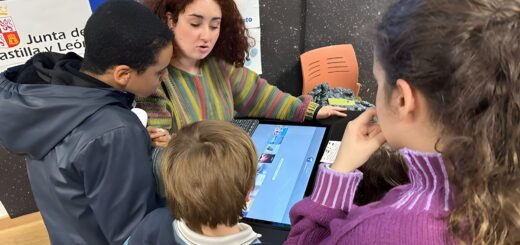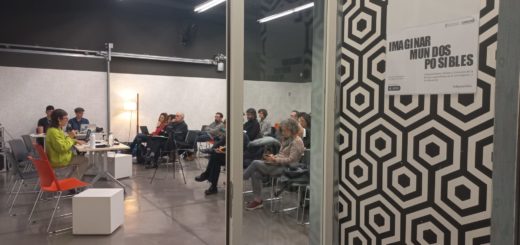Model of career management skills CAREERS
The design of the career management skills model CAREERS was based on desk research in which the main competences frameworks were reviewed and compared. Among them, the LEADER Model (Abad et al., 2017), which incorporates competence areas linked to personal effectiveness, relationship management, job search and access or life and career management; EntreComp (Bacigalupo et al., 2016), which consists of three interrelated competence areas –“Ideas and opportunities”, “Resources” and “In action”; or the “LifeComp Model” (Sala et al., 2020) which establishes three intertwined key competence areas (personal, social and learning to learn).
The CMS-CAREERS Model was also supported by the idea of professional development based on a learning paradigm proposed by Jarvis (2003) according to which, in flexible and dynamic work contexts, people need to be able to actively manage their professional lives. It defines a set of learning outcomes which can be emphasized at different points in life without referring specifically to groups and/or age groups.
The CMS-CAREERS Model is structured in three components:
- Learning areas, which bring together the set of competences and describe the skills, attributes, attitudes and knowledge that the model seeks to develop.
- Levels of competence, which describe the stages of development through which a person progresses.
- Activation levels, which correspond to the degree of action by the individual and also relate to the different level of support that guidance practitioners will need to provide as the individual progresses through the different learning areas, the type of services that will be needed and the competences required.
As a result of the desk research, six learning areas were defined (Figure 1) that integrated competences included in the models analysed, together with other innovative ones that respond to current social changes and challenges.
Thus, for example, the need to include digital competences, environmental, social and economic sustainability or democratic participation have played an important role in shaping the framework in general and in particular in the definition of learning outcomes.
Figure 1. CAREERS Model learning areas
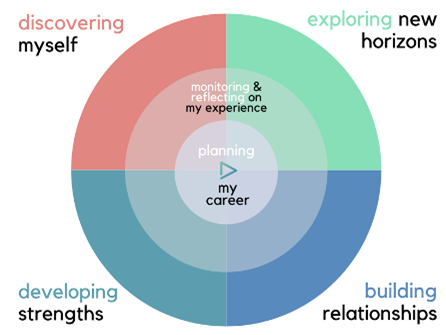
Source: CAREERS AROUND ME (https://www.careersproject.eu)
Table 1 presents the six learning areas together with the competences linked to each one.
Table 1. Learning areas and competences
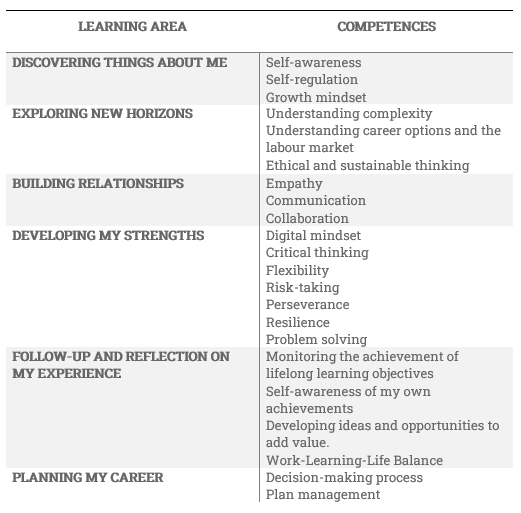
These learning areas are grouped into three levels of activation (Figure 2) according to the involvement required on the part of the individual. At the first level are the learning areas considered as fundamental (“discovering things about myself”, “exploring new horizons”, “building relationships” and “developing my strengths”), while the second and third levels correspond to the learning areas “monitoring and reflecting on my experience” and “planning my career”, respectively, where a more active engagement of the individual in the management of his/her career path is required.
Figure 2. Levels of activation of the CAREERS Model
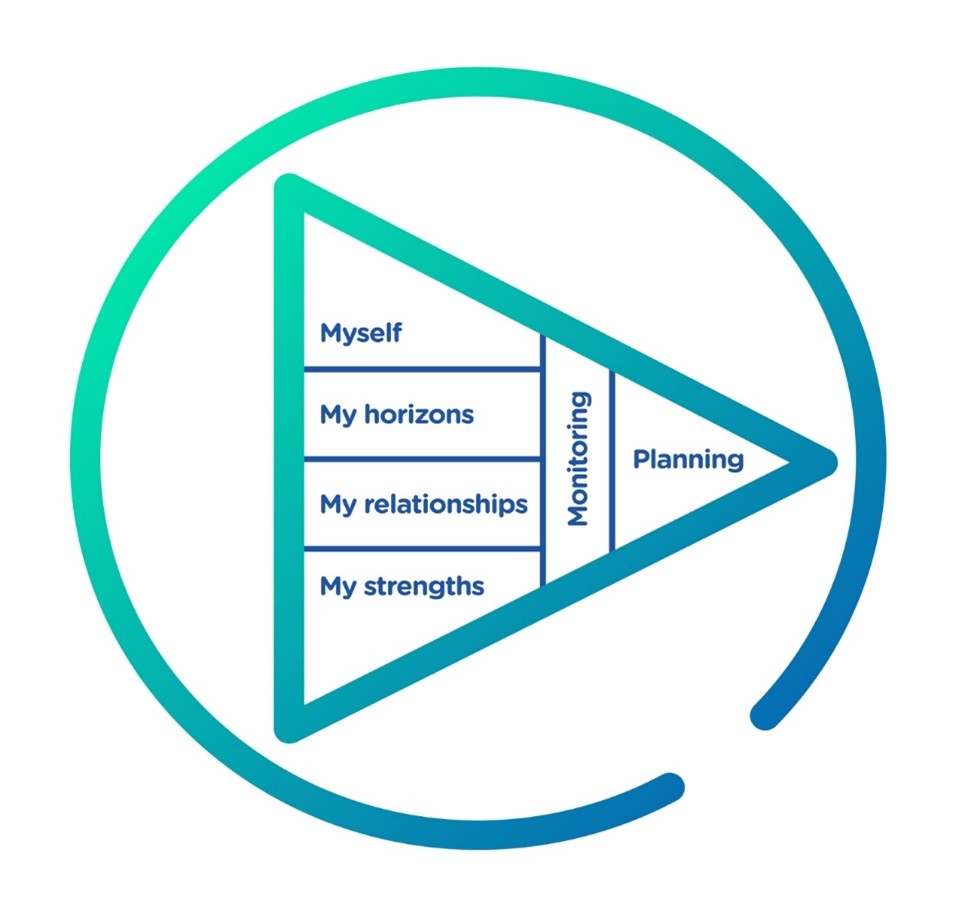
Source: CAREERS AROUND ME (https://www.careersproject.eu)
The CMS-CAREERS Model describes for each competence the learning outcomes at different levels of mastery, with the understanding that a person can start at a different point, progress through different stages, and return to earlier stages along their pathway, if needed, depending on their individual characteristics and circumstances.
Further information: https://www.careersproject.eu/
[1] Proyecto financiado por el programa Erasmus+ (2019-2022), coordinado por la Universidad de Camerino y partenariado de: Italia, España, República Checa, Austria y Rumanía (612881-EPP-1-2019-1-IT-EPPKA3-PI-FORWARD)
References
Abad, J., Amblás, S., Andricopoulou, A., Bujok, E., Iannis, G., Ilin, C.,…, Spanu, P. (2017). Improving Career Management Skills. Models, practices and guidance resources. Handbook for practitioners. Erasmus+ KA2. http://www.academia.edu/44883163/IMPROVING_CAREER_MANAGEMENT_SKILLS_Models_practices_and_guidance_resources_Handbook_for_practitioners.
Bacigalupo M., Kampylis P., Punie Y., & Van Den Brande L. (2016). EntreComp: The Entrepreneurship Competence Framework. EUR 27939 EN. Publications Office of the European Union. JRC101581.
Jarvis, P. S., & Keeley, E. S. (2003). From vocational decision making to career building: Blueprint, real games, and school counseling. Professional School Counseling, 6(4), 244-250.
European Lifelong Guidance Policy Network (ELGPN) (2012). Career Management Skills: Factors in Implementing Policy Successfully. University of Jyväskylä.
Erasmus+ CAREERS AROUND ME Project: https://www.careersproject.eu
Sala, A., Punie, Y., Garkov, V., & Cabrera, M. (2020). LifeComp: The European Framework for Personal, Social and Learning to Learn Key Competences. EUR 30246 EN. Publications Office of the European Union. doi: 10.2760/922681, JRC120911.
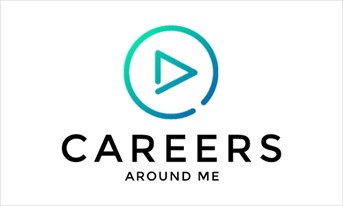
Authors:
Elena Fernández-Rey
Cristina Ceinos-Sanz
Miguel A. Nogueira-Pérez
Rebeca García-Murias
Research Group STELLAE
University of Santiago de Compostela
